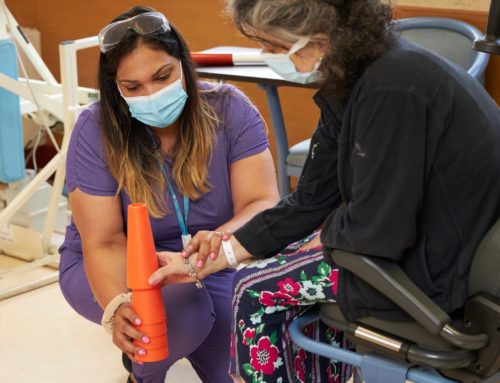Living With an Ileostomy: Does it Reduce Life Expectancy?
Luckily, an ileostomy won’t alter your life as much as you may think. There may be some changes that are required, though they aren’t anything too drastic. If you’ve recently had this procedure done, you may be concerned about how to go about living with an ileostomy.
An ileostomy is a procedure that may be required for those with a poorly-functioning colon. This could be due to Chrohn’s disease, ulcerated colitis, bowel cancer, or even an injury.
If you’re unsure what to expect when living with an ileostomy, here are the most common questions we’ve heard. Make sure that you talk to your doctor and always seek medical advice for things related to ileostomy as the information below is for education purposes only.

Living With an Ileostomy – Will It Shorten My Life?
The short answer is no, an ileostomy won’t shorten your life. In fact, it can reduce any uncomfortable or painful symptoms, making your life easier. Even if you have to live with an ileostomy permanently, you won’t have to worry about leaving your loved ones any sooner than expected.
Of course, there are always risks with any surgery. For an ileostomy, these can include internal bleeding, infections, intestinal blockage from scar tissue, or long healing times. Your doctor will monitor you closely and discuss any concerns or issues you may have.
There will be some recovery time needed after an ileostomy, though your hospital stay should only last a week or so. There are also some adjustments to your lifestyle that may be necessary, which we’ll discuss below.
How to adapt to it?
It may take some time to adapt to living with an ileostomy. There is some medical care and stoma care needed, including proper cleaning, and monitoring of the area for inflammation. You’ll also need to change the equipment regularly, which can take some practice.
You may need to alter your diet after an ileostomy and also colostomy. A low-fiber diet is a must for the first few weeks. This only lasts for 8 weeks, though, so you can resume your normal fiber intake after this time. Depending on your eating habits, you may also need to add healthier choices to your meals, including fruits, vegetables, and whole grains.
It’s a good idea to limit new foods, introducing only 1 per meal to allow your digestive system to adapt to it. Keeping a food diary can help you keep track of this, as well as everything else you’re eating. If you have issues with particular foods, this helps determine which ones are causing them.
Other alterations may include alternative medications, drinking more water to combat dehydration, and increased flatulence. You may not be able to participate in rougher sporting activities, though the rest of your activities shouldn’t be affected.
How do you sleep with an ileostomy?
Sleeping with an ileostomy can be tricky at first, though not impossible with a few minor adjustments. First, you’ll need to empty your ostomy bag to avoid filling it overnight. A light, early dinner at least 2 hours before bed helps with this as well. You may still need to empty it during the night, so an alarm will ensure you wake in time for this.
Securing your bag with an ostomy belt keeps it snugly against you during the night. Loose-fitting pajamas prevent the restriction of flow in the night. Sleeping on your back or side is best, though you may need to rest the bag on a pillow to keep it in place as it fills during the night. A good night’s rest also speeds up healing, making it more comfortable to live with an ileostomy.
This article contains informational and educational materials and does not replace health or medical advice. For questions or concerns regarding your medical condition or health objectives, speak to a qualified physician or healthcare provider.






I have my ileostomy for 42years. I was 18 when I had my ostomy and now I am 60 years of age. I have had hardly any problems with my ostomy and unless I become incapable Of looking after my stormy, I will go on living the best I can.
Jaynelynn, my daughter had a colostomy after a bowel perforation following a bout of severe UC. She is 20 years old . She just underwent a reversal surgery . Her Entyvio infusions that she has been getting since last year had healed the functioning part of her colon but moderate proctitis had remained on the other side. She is now waiting to see if Entyvio and currently steroids will help her go into remission but she also knows that she may need to have an ileostomy. She had some skin issues with the wafers of her bags, not from stool touching the skin but just reaction to the wafers which led to rash issues. Since you have had yours so long. Do you ever have skin issues due to the products ? I was just wondering?
Hi Linda,
I had a burning sensation whenever I changed my bag. I thought it was the stoma’s reaction to the new bag but it turns out that it was my skin surrounding the stoma that was giving the burning sensation. The culprit is the adhesive that sticks the bag to your skin. The surface of the skin gets damaged, especially when you remove a bag. The solution is to use an appropriate BARRIER CREAM! You only need a little. Rub it in once you have cleaned your stoma and the skin involved. You must wipe off any excess cream until the skin feels dry. Then simply fit on a new bag. The burning sensation will disappear after a week or so when the damaged skin has had time to heal. Good luck!
My husband also had an ileostomy, and the tapes and barriers and also the bag seem to make him itch and a rash we go thru product a lot ,he is hoping to get it reversed in February .
Hi Linda, I saw your comment directed to someone else so I hope you don’t mind me giving you a suggestion. My supplies come from coloplast charter and after I have cleaned and used adhesive remover wipes, I then apply a barrier wipe which I have found to work and the skin rash I had has disappeared. After applying the barrier wipe, leave it a couple of minutes to dry before applying the new bag or salts ring (if you use one). You can order them from your supplier or buy them from eBay, there is also a barrier spray, but coloplast charter barrier wipes worked great for me, hope this helps, regards, Alan.
Thank you, I have used a barrier that goes on before the bag, it has helped me limit the surrounding tissues from any stool I use a wet nap to clean stoma and it’s only a small area around the stoma that gets affected hense limiting any burning it works well.
I’m,new to this meaning having a illeostomy bag., my skin stings. I can’t sleep more than 2 hours without having to empty my bag, my skin has chsnged because of dehydration.,I ‘m depressed and financially going downhill. Please give me some advice.
I have had a illiostomy for 57 years. I can eat anything, do everything I want. I swim, downhill ski, cross country ski, hunt fish golf, I have no restrictions. The only problem is I have trouble keeping my weight down, because I can eat everything. I am 79 years old.
I have had an ileostomy for some time and am considered ‘high output’. That means that I must change my appliance (wafer) about 4-5 times a day. I expel more than most so subsequently, inevitably leak around the seal and have painful skin issues. Something that I worked out was to create a hole as close to my stoma as possible. Cutting a hole with those curved scissors many times a day really got to me physically and mentally. I use appliances from Hollister which include a cardboard ‘sizer’ to give you an accurate measurement of your stoma. Then I simply looked on Amazon for a steel punch, got a piece of Hardwood and a hammer. I can punch out the right-sized holes at a rate of 1 every 10 seconds! With the area of exposed skin substantially lessoned, my ‘burned’ skin is much smaller and easier to deal with. Price Approx $23.00. SO much better!!